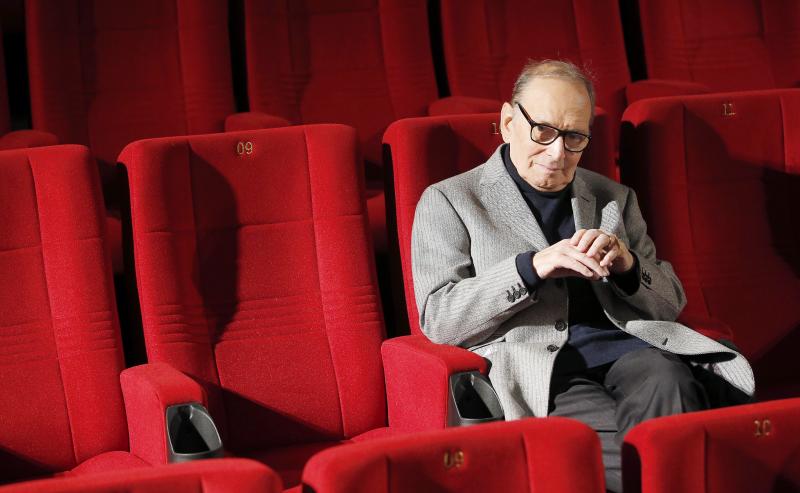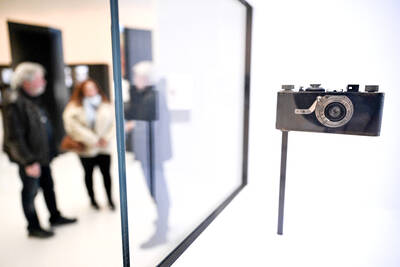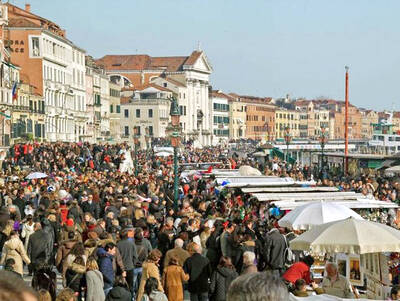Ennio Morricone, arguably the world’s greatest and most prolific composer for the cinema, had originally intended to write “serious” music and saw his film-writing career more as a lucrative sideline.
“My real purpose was to write classical music,” said Morricone, who is perhaps best known for his scores to Sergio Leone’s “spaghetti westerns” and who belatedly won an Oscar in 2016 for Quentin Tarantino’s “The Hateful Eight.” “Since the conservatoire, that was my ambition. Then, of course, you have to live — and you can make money from film music. That’s just how my life went,” he told AFP in an interview in 2016.
Born in Rome on Nov. 10, 1928, Morricone started composing at the tender age of six, and at just 10 he enrolled in a trumpet school at the prestigious Saint-Cecilia conservatory in Rome. He studied composition, orchestration and the organ and would cite Karlheinz Stockhausen, Pierre Boulez, Luigi Nono and Aldo Clementi as composers who influenced him.

Photo: AP 照片:美聯社
In fact, Morricone wrote more than 80 “classical” pieces, ranging from solo piano to chamber and orchestral music. Nevertheless, he didn’t mind knowing that he was most famous for film soundtracks, of which he composed more than 500 across a 60-year career. “I was able to compose music freely, and in such different forms, not only because I could rely on technology, but also because it was essential that I change my style for every film. Every movie required it,” he said.
Morricone also made forays into Italian pop song and collaborated with Portuguese Fado star Dulce Pontes and French chanteuse Mireille Mathieu. He played the trumpet in jazz bands in the 1940s before he started ghost writing for film and theater.
It was in the 1960s that his film-writing career really took off with the scores to his childhood friend Sergio Leone’s westerns, “A Fistful of Dollars,” “The Good, the Bad and the Ugly” and “A Few Dollars More.” He continued to collaborate closely with Leone, making eight films together, notably the 1984 gangster epic “Once Upon a Time in America.”
Morricone also worked with Italian screen legends Federico Fellini and Pier Paolo Pasolini and later with the likes of Pedro Almodovar, Bernardo Bertolucci, Brian De Palma and Oliver Stone.
Morricone received no fewer than six Oscar nominations for best film soundtrack. He did not hide his disappointment when his soaring score for Roland Joffe’s epic “The Mission” was trumped at the 1986 Oscars by the jazz soundtrack for Bertrand Tavernier’s “Round Midnight.” It remains one of the most controversial decisions in the Academy’s history and Morricone told Britain’s the Guardian that he had felt robbed.
In 2007, the Academy of Motion Picture Arts and Sciences presented him with a lifetime achievement award. But it was not until 2016 that he was finally awarded an Oscar for his score to Quentin Tarantino’s “The Hateful Eight.” In an interview with AFP, he said he had initially been wary that he would be expected simply to rehash the work he did for Leone. But Tarantino’s “beautiful and interesting” script convinced him in the end. “I wanted it to have its own sounds. I didn’t want the music to be the leftovers of what I did for Leone.”
Morricone was considered a fine conductor, too, even if he rejected the title. “The problem is that I am not a real conductor, I do not direct the music of other composers,” he said.
Morricone said his success lay in evoking thought patterns. “I tried to create a way to write music with a lot of pauses, made up of almost monosyllables, or three syllables put together, and then a pause, a bit like a thought that comes and goes and repeats itself in a different way,” he said.
He insisted he had no secret recipe other than being true to himself. “I have always wanted to change, but at the end I remain myself.”
(AFP)
顏尼歐.莫利克奈可說是世界上最偉大也最多產的電影配樂作曲家。不過,他最初想要創作「嚴肅音樂」,而且認為自己的電影配樂創作生涯比較像是一項報酬頗豐的副業。
莫利克奈曾說:「我真正的志業是創作古典音樂。」今日,這位大師最為人所知的成就,或許仍是他為塞吉歐‧李昂尼執導的「義大利式西部片」創作的配樂,以及二○一六年、以昆汀‧塔倫提諾執導的《八惡人》贏得一座遲來的奧斯卡獎。在當年的訪談中,莫利克奈告訴法新社:「從音樂院時期開始,創作古典音樂就是我的抱負。後來,當然,你還是要為五斗米折腰──而我發現自己可以從電影配樂賺到錢。我的人生就是這樣走了過來。」
莫利克奈在一九二八年十一月十日生於羅馬,於六歲稚齡開始作曲,年僅十歲即就讀於羅馬聲譽顯赫的聖西西利亞音樂院,主修小號。在音樂院期間,他學習作曲、管弦樂配器,以及管風琴演奏。被問到曾受哪些作曲家的影響時,莫利克奈會舉出卡爾海茵茲‧史塔克豪森、皮耶‧布列茲、路易吉‧諾諾,以及阿爾多‧克萊門蒂等當代作曲家。
事實上,莫利克奈寫下超過八十首「古典音樂」作品,類型涵蓋鋼琴獨奏、室內樂,以及管弦音樂。儘管如此,他並不介意自己最有名的是電影配樂。在六十年生涯中,莫利克奈寫下超過五百部電影配樂。他曾說:「我能夠自由地創作音樂,而且以如此不同的形式呈現,不只是因為我能仰賴科技的幫忙,為每一部電影改變我的風格也是不可或缺的。每一部電影都需要(不同風格的音樂)。」
莫利克奈曾短暫嘗試寫作義大利流行歌曲,合作過的對象還包括葡萄牙法朵音樂明星多切‧邦蒂絲,以及法國國民香頌天后米蕾耶‧瑪蒂厄。一九四○年代,莫利克奈曾在爵士樂團中演奏小號,後來才開始為電影和劇場配樂捉刀。
直到一九六○年代,莫利克奈為孩提時代好友李昂尼執導的西部片創作配樂,他的電影配樂生涯才真正起飛。這些西部片包括《荒野大鏢客》、《黃昏三鏢客》,以及《黃昏雙鏢客》。他持續和李昂尼密切合作,兩人總共一起完成八部電影,最受注目的包括一九八四年的犯罪史詩電影《四海兄弟》。
莫利克奈也和義大利影壇傳奇費德里柯‧費里尼和皮耶‧保羅‧帕索里尼共事過。後來合作的導演還包括佩德羅‧阿莫多瓦、貝納多貝‧托魯奇、布萊恩‧狄帕瑪以及奧立佛‧史東。
莫利克奈獲奧斯卡獎提名最佳原創配樂獎多達六次。一九八六年,他為羅蘭‧約菲的史詩電影《教會》譜下的動人作品獲奧斯卡提名,奪獎似乎勢在必得,大獎卻在最後一刻被貝特朗‧塔維涅《午夜時分》的爵士配樂抱走。當天,莫利克奈的失望表露無遺。那年這個獎項至今仍是奧斯卡歷史上最受爭議的決定之一,莫利克奈向英國《衛報》表示,他當時覺得自己好像被搶了。
二○○七年,美國電影藝術與科學學會將奧斯卡終身成就獎頒給莫利克奈。只是,一直到二○一六年,莫利克奈才以他為塔倫提諾的《八惡人》創作的配樂,獲得一座奧斯卡最佳原創配樂獎。在接受法新社訪問時,莫利克奈表示他最初抱著戒慎恐懼的心情,以為會被期待老調重彈,單純再做一部像當年為李昂尼寫的西部片配樂。最後,是塔倫提諾「美麗而有趣」的劇本說服了他。「我希望這部電影擁有自己的聲音,我不想要讓這部配樂成為我為李昂尼創作後剩下的殘羹敗餚。」
莫利克奈被視為一位好指揮家,就算他本人拒絕接受這個頭銜。他說:「問題在於,我並不是一位真正的指揮,我沒有指揮過其他作曲家的作品。」
莫利克奈表示,他的成功在於用音樂喚起思緒般的片段。他指出:「我試著創造出一種運用很多休止的作曲方式,音樂幾乎完全以單音節構成,或是三個音節組合在一起,然後暫停下來,有點像是一片思緒來了又離開,以不同的方式自我重複。」
莫利克奈堅持說,除了做真實的自己,他沒有什麼創作的秘密。「我一直都想要改變,但是最後還是當自己。」他這麼說。
(台北時報章厚明譯)

Photographer Franziska Stuenkel likes to take spontaneous urban shots, so she needs a nimble camera that is ready to go when inspiration strikes: her German-made Leica M11. “I have to be very quick and discreet,” said the Berlin-based artist who captures reflections of people walking past windows, their contours merging with the shapes behind the glass. Stuenkel’s compact Leica is the perfect camera for the job, the 51-year-old told AFP. Famous for its pocket-sized and retro-style devices, the Leica brand is celebrating a milestone as it marks 100 years since its first commercial camera was presented to the public. The

As global travel rebounds following the COVID-19 pa ndemic, the longstanding issue of overtourism has returned stronger than ever. Throughout 2024, numerous popular destinations worldwide struggled with tourist numbers that far exceeded their infrastructural and environmental capacities. Not only does this surge congest streets and pollute landscapes, but it also endangers cultural sites and disrupts the daily lives of residents. In response to the growing problem of “overtourism,” various nations have adopted diverse strategies, some of which have sparked controversy. Venice, Italy, has not hesitated to take bold action; since 2024, the city has implemented one of the

A: This year’s Met Gala, the Metropolitan Museum of Art’s fundraiser, is coming on the first Monday of May. B: The event, featuring a lineup of stars, is often praised as fashion’s Oscars. A: Some Asian stars, like Taiwanese pop diva Jolin Tsai, have also attended in the past. B: What are the theme and dress code this time? A: This year’s theme is “Superfine: Tailoring Black Style.” It’s the first time since 2003 that the theme is focusing on menswear. The dress code is “Tailored for You.” A: 哇今年的大都會博物館慈善晚宴「Met Gala」,即將在5月第一個星期一登場。 B: 這可是被譽為「時尚奧斯卡」的年度盛事,許多巨星都會參加耶。 A:

Dogs’ noses are incredibly keen. They can even detect changes in cortisol levels in human sweat and breath. Known as the “stress hormone,” cortisol increases when humans are under pressure. Recent research indicates that the smell of human stress can influence a dog’s behavior and emotions. In the study, human volunteers were exposed to the stressful tasks of preparing and delivering a speech on the spot and then solving math problems. __1__ Researchers collected sweat and breath samples from the volunteers on pieces of cloth during both their stressful and restful states. Meanwhile, other researchers worked with 18